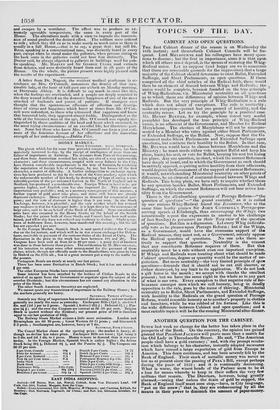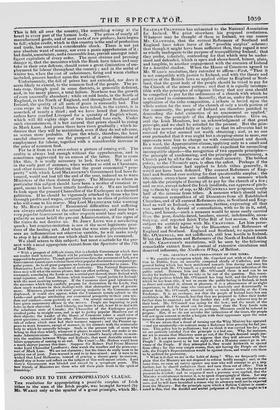ANOTHER QUESTION FOR THE CABINET.
SINCE last week no change for the better has taken place in the prospects of the Bank. On the contrary, the opinion has gained ground that President JACKSON will prove more than a match for the Old Lady in Threadneedle Street. He said, "The American people shall have a gold currency ;" and, with the prompt resolu- tion which belongs to his character, instantly adopted measures which have caused a large exportation of gold from Europe to America. This drain continues, and has been severely felt by the Bank of England. Their stock of metallic money was never so low as at present since the passing of PEEL'S Bill, except perhaps during the panic of 1825: and it is continually decreasing. What is worse, the wisest heads of the Parlour seem to be at a loss for means whereby to keep in their coffers the very few millions that remain. The Directors, however, being greatly alarmed,—seeing that unless the drain of gold be stopped, the Bank of England itself must soon stop,-Lhave, in City language, " put on the screw ;' that is, they are endeavouring by all the means in their power to diminish the amount of paper-money. to stop it by a different one which shall be under his command. Mr. O'CONNELL, are not indifferent, still less hostile to Ireland. • We shall return to this subject; but must conclude for the pre- What the Dissenters and Reformers of the North of Ireland think sent with a most appropriate extract from the Spectator of the 7th of Mr. CRAWFORD'S resolutions, will be seen by the following of last May. remarkable extract from a journal of extensive circulation and a With a prospect of difficult times, that is a foolish Government which does deserved influence, the Northern Itihig, of Belfast. not render itself beloved. Much will be patiently borne when the rulers are " MR. SHARMAN CRAWFORD—SPIRIT OF THE TIMES. supposed to be patriotic. Though good intentions form the pavement of hell, yet a " We consider the reception which Mr. Crawford met with at the Associa- Government cannot exist without them when popular discontent accompanies po- tion in Dublin, from an assembly composed chiefly of Catholics, and the pular power. As to all great purposes, we have no government but in name. The general feeling which has been manifested towards him during and since his Obstructive Lords stop the machine of authority. The National Represents- controversy with Mr. O'Connell, as a powerful and important indication of the rives may will what the nation pleases, but can effect nothing. The Whole Go. public mind. Between him and Mr. O'Connell there is and can be no "eminent, considering the Lords as an essential part thereof, treats Ireland with rivalry for leadership. That we take to be out of the question. But, consi- cruel injustice, and Great Britain, which demands ' equal justice fur Ireland,' tiering the position which Mr. O'Connell has long held, and the facility with with the most insulting contempt. If the Commons show good intentions by which lie has been able, if not to create the public feeling in Ireland, at least the measures which they carefully prepare for destruction by the Lords, they to direct and control it, almost at pleasure, it is a phenomenon of no slight show much weakness in their dealings with that obstructive part of govern- importance, to find the man who ventured so fearlessly and determinedly to went. Ministers, pleased with their growing majority in the Commons—nut dissent from Mr. O'Connell, received with so much cordiality at the Corn
displeased, it would also appear, when the Commons tamely submit to the Exchange. It is an evidence, not that the people of Ireland have lost any Lords—and perhaps attributing our economical prosperity to their own wis•
dom and conduct—seem perfectly at ease. On several recent occasions they further than he expected ; and that furthCr they will go, whoever may be at have given unnecessary offence to the masses. People are beginning to pick their head. Mr. O'Connell was acting for the best ; and the result of the holes in their character. Lord Glenelg, one hears it said, is not tit to deal with
the rebellious state of Canada; the Chancellor of the Exchequer prefers disposed to grant, ar .1 for as much as, perhaps, Ministers could be induced to'
crooked paths to straight ones, and is apt to jockey popular Members out of propose. But, if we do not mistake the indications of the times, the people their objects; the Leader of the house of Commons takes a small view of will not again consent to strike a bargain with their oppressors upon the same great questions; several of the other Ministers indecently vote against propo- terms as those previously offered. sals of reform which once had their warmest support ; and the Premier ap- " We are aware that a dread of turning out the Whig Ministry has operated pears to want firmness, except of manner, in his contests with the aristocratic —and not unnaturally—to restrain many a Reformer from pressing for full jus- body to which he naturally belongs. Such is the present talk of many who lice. This policy has its palliation' ; but we think it was carried too far ; and
belong to that class which, whenever it pleases to exert itself, can make or un- we are perfectly satisfied that the principle is a bad one. Why, for instance, make Administrations. Notwithstanding O'Connell's hearty efforts to main- tain the coalition between Whigs and Radicals, that most desirable union ex- tire? Is it not more reasonable to suppose that they will advance with the
hibits symptoms of coming to an end. The Court !—Mr. Hudson would have People ? It ought never to be lost sight of, that a Ministry cannot go in ad- a much shorter journey this time. Suppose Sir Robert Peel Prime Minister vance of the People. If they attempted it, they would forthwith lie ejected under Lord Chancellor Lyndhurst; then watch the weather and the price-cur- from office ; for this very simple reason, that, not having the People on their rent of Mark Lane. We are not alarmists ; but the times do really seem to be side the People's Representatives would be against them, and would vote them getting out of joint. Fore-warned is said to be fore-armed : and it were to be to be unfitted for governing. wished that Lord Melbourne, instead of gracing a dinner-party to-morrow, " What is it that we are in the habit of doing ? Why, we frequently com- should stay at home and reflect on the subject of this well-meant article. Lord plain that the Ministry are not disposed to reform boldly enough ; and, at the
Grey's Government was blinded and ruined by a sycophant press. The same time, we raise an outcry against any man who will attempt to go a step best friends of Ministers are those who tell them plain truth in the spirit of
friendship." further, lest he should embarrass them and turn them out of office. This is



























 Previous page
Previous page